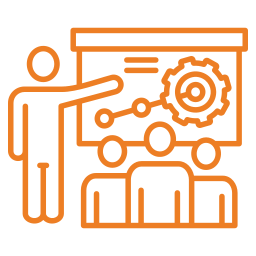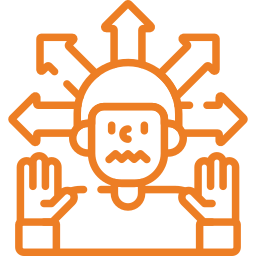Acceleration
Our acceleration programs focus on fast-tracking your startup’s growth through:
- Intensive training sessions on scaling operations and building teams.
- Connections with potential clients, partners, and investors.
- Assistance in creating a robust go-to-market strategy.
- Regular performance evaluations to ensure progress.

What is an accelerator?
A business accelerator is a program designed to help established startups scale quickly, and often provide funding in exchange for equity in the business.
Accelerators often require startups to already have a minimum viable product or a fixed team before they can apply. Once admitted, startups go through an intense period of growth and development, often over the course of three to six months.
During this time, startups receive mentorship and resources from experienced entrepreneurs, investors, and business leaders. Startup accelerators typically culminate in a Demo Day, where startups pitch their businesses to a room full of potential investors.
Business accelerator program examples
There are many different types of accelerator programs scattered throughout the world. Some are run by corporations or venture capital firms while others are government- or university-sponsored. Startup accelerator programs can also focus on a specific industry, like technology or health care.
Here is a list of some business accelerator programs and what they offer:
Draper Startup House Accelerator
Draper Startup House Accelerator is an Austin, Texas-based program that offers mentorship, funding, and even co-living.
V@Ccelerate
V@Ccelerate is a four-month program for startups across India offering networking opportunities and exposure to investors.
Envision
Envision is an equity-free accelerator program with the goal of shining a light on underrepresented talent in the startup industry.
Women’s Innovation Fund Accelerator
Women’s Innovation Fund Accelerator is an early-stage impact fund helping underrepresented, sustainable, and emerging tech startups scale quickly.
Up2B Accelerator
Up2B Accelerator is an organization that has a number of different programs aiming to help startups test their products, find investors, or even fine-tune their sales structures.
TECHHOUSE Accelerator
TECHHOUSE Accelerator is a 15-week program in Austria helping early-stage technology startups get the funding, mentorship, and resources they need to scale.
The Long Beach Accelerator
The Long Beach Accelerator is a unique program built by the city of Long Beach that provides startups with capital, coaching, and much more.
Techstars
Techstars is a U.S.-based fund with virtual, hybrid, and in-person accelerator programs located across the world.
How business accelerators work
Business accelerators are programs that generally focus on either growth or market access. They do this by providing things like funding, training, networking, and even the opportunity to pitch your business to investors when the program concludes.
These programs can be especially grueling, often involving three to six months of intense coaching, mentorship, required meetings, and more.
Many accelerators work with or are founded by angel investors or venture capital firms, providing an invaluable network for startups to tap into even after the program has ended. While accelerators typically do not charge fees for their services, they will likely require equity in your startup.

The pros and cons of a business accelerator
There are a lot of perks that come with joining a business accelerator, though there are some pitfalls to consider as well. Not every startup needs an accelerator, and getting involved in one before you’re ready could lead to some setbacks and headaches.
Understanding The Pros And Cons of a Business Accelerator

Funding

Mentorship

Networking

Demo Day

Loss of Equity

Distractions

Major commitment

Rapid growth
What are the benefits of a business accelerator?
Accelerators provide a way for startups to fast-track their growth. In addition to the resources and mentorship they receive, being part of an accelerator can also help startups validate their business idea, build a customer base, and raise capital. Some of the benefits of a business accelerator include:
- Access funding that can help you stop worrying about your next big project.
- Tap into a network that can help you expand your business and secure investments even after the program has finished.
- Learn tips and tricks that can help your startup blossom from some of the best and brightest professionals in your industry.
- Pitch your startup on Demo Day to investors who can help you scale your business and access new markets.
What are the downsides of a business accelerator?
Overall, business accelerators can be a great way for startups to get their business off the ground. However, it’s important to weigh the cons before making the decision to join one. A few downsides of a business accelerator you should consider include:
- Loss of equity can be a tough pill to swallow for some founders.
- Accelerators come with serious commitments and could require you to take time away from your family or even move to another city.
- There is no guarantee that your business will succeed after the program.
- Not every business model is fit for rapid short-term growth.
- Required meetings, coaching sessions, and other potential distractions could pull you away from work that you need to be doing.
- There is no guarantee that your business will succeed after the program.
FAQ"s
What is an acceleration program?
Mentoring relationships come in various formats. The most common are 1-to-1, where one mentor is matched with a single mentee; group mentoring, which involves one mentor and multiple mentees; and affinity groups or circles, which bring together people from similar backgrounds. No matter the format chosen, each type of relationship has the potential to be rewarding for both parties involved.
Who can apply for the acceleration program?
Our acceleration programs are open to startups at the growth stage with a validated product or service and a clear market fit. Founders must be committed to scaling their business.
How long does the program last?
The duration of our acceleration programs typically ranges from 3 to 6 months, depending on the specific program and its objectives.
What kind of support will I receive during the program?
You’ll gain access to:
- Intensive training on scaling operations, building teams, and market strategies.
- Direct connections with potential clients, partners, and investors.
- Ongoing mentorship from industry experts and seasoned entrepreneurs.
Is there any cost to join the program?
Some programs are fully funded, while others may require a nominal fee or equity stake. Specific details will be outlined for each program.
What industries does the program focus on?
Our acceleration programs cater to a wide range of industries, including technology, fintech, healthcare, retail, and more. Specific programs may have targeted industry focus areas.
What are the eligibility criteria?
Eligibility criteria may include:
- A strong founding team.
- A scalable business model with a proven product/service.
- Clear growth potential and a market-ready solution.
How can I apply for the program?
You can apply through our online application portal. Keep an eye on the application deadlines for each batch.
Will I receive funding through this program?
While our primary focus is on mentorship and networking, many programs also provide seed funding or connect you to investors for potential funding opportunities.
10. What happens after the program ends?
After completing the program, you’ll become part of our alumni network, gaining access to continued support, networking opportunities, and invitations to exclusive events.
